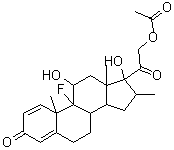Dexamethasone-17-acetate
Inquiry
| Post Date: | Jun 25,2015 |
| Expiry Date: | Jun 24,2016 |
| Detailed Description: |
Cas No. :1177-87-3
Dexamethasone-17-acetate
Dexamethasone-17-acetate Basic information CAS: 1177-87-3 MF: C24H31FO6 MW: 434.5 EINECS: 214-646-8 Synonyms : Dexamethasoneacetate; Dexamethasone Acetate; Dexamethasone-17-acetate; (11beta,16alpha)-9-fluoro-11,21-dihydroxy-16-methyl-3,20-dioxopregna-1,4-dien-17-yl acetate; (11beta,16alpha)-9-fluoro-11,17-dihydroxy-16-methyl-3,20-dioxopregna-1,4-dien-21-yl acetate; (16alpha)-9-fluoro-11,17-dihydroxy-16-methyl-3,20-dioxopregna-1,4-dien-21-yl acetate;(8xi,11beta,14xi,16alpha)-9-fluoro-11,17-dihydroxy-16-methyl-3,20-dioxopregna-1,4-dien-21-yl acetate; Product Categories: Biochemistry; Hydroxyketosteroids; Steroids Dexamethasone-17-acetate Chemical Properties mp 238-240 °C(lit.) refractive index 87 ° (C=1, Dioxane) storage temp. 2-8°C IUPAC Name: [2-[(8S,9R,10S,11S,13S,14S,16R,17R)-9-Fluoro-11,17-dihydroxy-10,13,16-trimethyl-3-oxo-6,7,8,11,12,14,15,16-octahydrocyclopenta[a]phenanthren-17-yl]-2-oxoethyl] acetate Molecular Weight: 434.497743 [g/mol] Molecular Formula: C24H31FO6 XLogP3: 2.8 H-Bond Donor: 2 H-Bond Acceptor: 7 EINECS: 214-646-8 refractive index: 87 ° (C=1, Dioxane) Index of Refraction: 1.571 Molar Refractivity: 109.82 cm3 Molar Volume: 334 cm3 Surface Tension: 52.9 dyne/cm Density: 1.3 g/cm3 Flash Point: 304.2 °C Enthalpy of Vaporization: 99.54 kJ/mol Boiling Point: 579.4 °C at 760 mmHg Vapour Pressure: 7.75E-16 mmHg at 25 °C Water Solubility: 5.47 mg/L at 25 °C Melting Point: 238-240 °C(lit.) Classification Code of Dexamethasone acetate (CAS NO.1177-87-3): Anti-Inflammatory Agents; Reproductive Effect Uses1. Dexamethasone acetate (CAS NO.1177-87-3) is used to treat many inflammatory and autoimmune conditions, such as rheumatoid arthritis. It is useful to counteract allergic anaphylactic shock, if given in high doses. Dexamethasone acetate is used in transvenous screw-in cardiac pacing leads to minimize the inflammatory response of the myocardium. 2. In oncology, it is given to cancer patients undergoing chemotherapy, to counteract certain side-effects of their antitumor treatment. Dexamethasone can augment the antiemetic effect of 5-HT3 receptor antagonists like ondansetron. Dexamethasone acetate is also used in certain hematological malignancies, especially in the treatment of multiple myeloma, in which dexamethasone is given alone or together with thalidomide (thal-dex) or lenalidomide, or a combination of Adriamycin (doxorubicin) and vincristine (VAD). In brain tumours (primary or metastatic), Dexamethasone acetate is used to counteract the development of edema, which could eventually compress other brain structures. It is also given in cord compression where a tumor is compressing the spinal cord. 3. Dexamethasone acetate is the treatment for the very rare disorder of glucocorticoid resistance. In adrenal insufficiency and Addison's disease, it is prescribed when the person doesn't respond well to prednisone or methylprednisolone. 4. Dexamethasone acetate is used in the treatment of high altitude cerebral edema as well as pulmonary edema. It is commonly carried on mountain climbing expeditions to help climbers deal with altitude sickness. 5. Dexamethasone acetate has been used as an off-label pre-natal treatment for the symptoms of congenital adrenal hyperplasia (CAH) in female fetuses. has also been used in the hope of enhancing sports performance. Dexamethasone acetate is also used in a diagnostic context, namely in its property to suppress the natural pituitary-adrenal axis. 6. Combined with marbofloxacin and clotrimazole, dDexamethasone acetate used to treat difficult ear infections, especially in dogs. It can also be combined with Trichlormethiazide to treat horses with swelling of distal limbs and general bruising. Dexamethasone-17-acetate Usage And Synthesis Chemical Properties Off-White Solid Usage Protected Dexamethasone, a glucocorticoid anti-inflammatory agent. Safety ProfileExperimental teratogenic and reproductive effects. A steroid. When heated to decomposition it emits toxic fumes of F−. Hazard Codes: Xi Risk Statements: 43 R43:May cause sensitization by skin contact ; Safety Statements: 36/37 S36/37:Wear suitable protective clothing and gloves ; WGK Germany: 3 RTECS: TU4050000 |
| CAS Registry Number: | 1177-87-3 |
| Synonyms: | ;Dexamethasoneacetate;Dexamethasone Acetate;Dexamethasone-17-acetate;(11beta,16alpha)-9-fluoro-11,21-dihydroxy-16-methyl-3,20-dioxopregna-1,4-dien-17-yl acetate;(11beta,16alpha)-9-fluoro-11,17-dihydroxy-16-methyl-3,20-dioxopregna-1,4-dien-21-yl acetate;(16alpha)-9-fluoro-11,17-dihydroxy-16-methyl-3,20-dioxopregna-1,4-dien-21-yl acetate;(8xi,11beta,14xi,16alpha)-9-fluoro-11,17-dihydroxy-16-methyl-3,20-dioxopregna-1,4-dien-21-yl acetate; |
| Molecular Formula: | C24H31FO6 |
| Molecular Weight: | 434.4977 |
| Molecular Structure: | 
|
| Hazard Symbols: |  Xi:Irritant; Xi:Irritant; |
| Risk Codes: | R43:; |
| Safety Description: | S36/37:; |
| Company: | Hulumimi Pharmaceuticals [ China ] |
| Contact: | Toni Zhong |
| Tel: | 027-50756080 |
| Fax: | 0086-27-88048077-794 |
| Email: | toni@ycgmp.com |
-
Disclaimer statement:The information and data included above have been realized by the enterprises and compiled by the staff, and are subject to change without notice to you. The Chemnet makes no warranties or representations whatsoever regarding the facticity, accuracy and validity of such information and data. In order to ensure your interest, we suggest you chose the products posted by our gold suppliers or VIP members.


